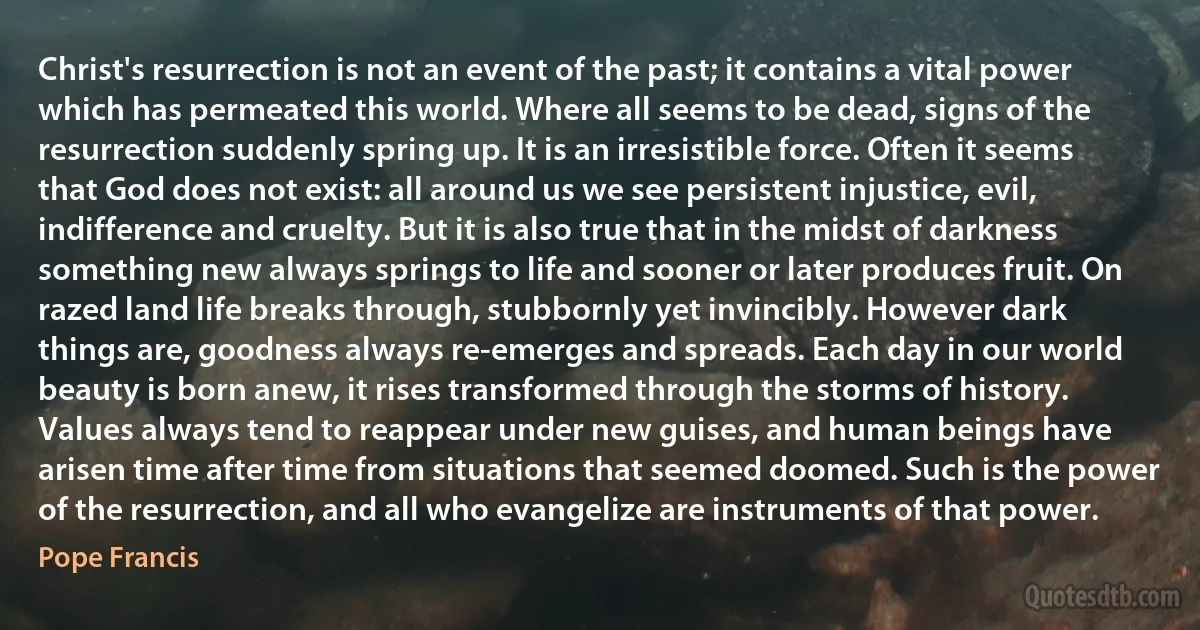
Christ's resurrection is not an event of the past; it contains a vital power which has permeated this world. Where all seems to be dead, signs of the resurrection suddenly spring up. It is an irresistible force. Often it seems that God does not exist: all around us we see persistent injustice, evil, indifference and cruelty. But it is also true that in the midst of darkness something new always springs to life and sooner or later produces fruit. On razed land life breaks through, stubbornly yet invincibly. However dark things are, goodness always re-emerges and spreads. Each day in our world beauty is born anew, it rises transformed through the storms of history. Values always tend to reappear under new guises, and human beings have arisen time after time from situations that seemed doomed. Such is the power of the resurrection, and all who evangelize are instruments of that power.
Pope FrancisRelated topics
born beauty dark darkness day dead evil force fruit goodness history human land later life midst past power see something spring time under vital world yet sooner thingsRelated quotes
Why should we put up with the present evils in our society? As opposed to the society we are visualizing, the present one can be described as a diseased one. The evils are there on all levels, international and national, and even within the smaller units such as towns and families. Of course, the disease did not appear like a bolt from the blue, either yesterday, or last year. It is the result of factors that have deep roots and long lives. These consist of privations, discriminations oppressions, bigotries, hatreds, and hostilities; poverty, ignorance, hunger, and illiteracy. Each and all of these have been left to us as ar evil heritage from the past. The fundamental difference between our situation today and that of our forefathers is that now knowledge has enabled us to realize that these evils are neither natural nor inevitable in the same way as we have found that cholera or the bubonic plague are not necessary calamities.

Muhammad Reza Pahlavi
I shall present a theory - which I call "the theory of the managerial revolution." During the past century, dozens, perhaps even hundreds, of "theories of history" have been elaborated. All of the theories, with the exception of those few which approximate to the theory of the managerial revolution, boil down to two and only two. The first of these predicts that capitalism will continue for an indefinite, but long, time, if not forever:' that is, that the major institutions of capitalist society, or at least most of them, will not be radically changed. The second predicts that capitalist society will be replaced by socialist society. The theory of the managerial revolution predicts that capitalist society will be replaced by "managerial society," that, in fact, the transition from capitalist society to managerial society is already well under way.

James Burnham
Ancient scriptures tell us that man is more than the physical body. In fact, we have two bodies: the physical and the astral, or subtle. But we are the soul! According to the ancient Vedic scriptures of India, the size of the soul is 1/10,000 the tip of a strand of hair. It is located in the heart region and is the actual life force. The physical, as well as the astral or subtle body, acts as a covering or costume that the soul wears in its journey throughout the material sphere. As we pass from costume to costume or from body to body through the process known as reincarnation, the impressions of previous lives imprint themselves on the subtle body and are carried with us during each lifetime. In the dream state, activity in the subtle body becomes more dominant than activity in the physical body. Our dream experiences are often impressions accumulated from many lifetimes.

Bhakti Tirtha Swami
I told him how we kept fewer forms between us and God; retaining, indeed, no more than, perhaps, the nature of mankind in the mass rendered necessary for due observance. I told him I could not look on flowers and tinsel, on wax- lights and embroidery, at such times and under such circumstances as should be devoted to lifting the secret vision to Him whose home is Infinity, and His being - Eternity. That when I thought of sin and sorrow, of earthly corruption, mortal depravity, weighty temporal woe - I could not care for chanting priests or mumming officials; that when the pains of existence and the terrors of dissolution pressed before me - when the mighty hope and measureless doubt of the future arose in view - _then_, even the scientific strain, or the prayer in a language learned and dead, harassed: with hindrance a heart which only longed to cry - "God be merciful to me, a sinner!"

Charlotte Brontë
My dearest little Julie, I love you as I lie dying; I shall still love you when I am dead. I beg of you, do not cry; this parting was inevitable. I would have liked to be with you until you married – Work hard and be good as you have always been; you have never caused me a moment's sorrow in you little life [Julie is 16, then]. You have beauty, good fortune; use them well. I think the best thing would be to live with your cousins in the Rue de Villejust, but I do not wish to force you to do anything. Give a memento of me to you aunt Edma [Berthe's sister], and to your cousins too; and give Monet's [painting] 'Bateaux en reparation' to your cousin Gabriel. Tell M. Degas that if he found a museum he is to choose a Manet [of her Manet paintings]. A keepsake for Monet; one for Renoir, and one of my drawings for Bartolomé. Give something to the two concierges. Do not cry, I love you more than I can tell you.

Berthe Morisot
